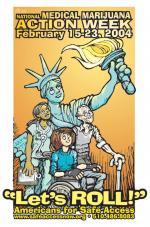Feature Archives
Mon Mar 8 2004
West Coast Debut of "Generation E"
On Wednesday, March 10th, the West Coast premiere screening of "Generation E," was held at UC Berkeley. "Generation E" is a feature-length documentary on a new federal bill known as the R.A.V.E. Act and its relationship to the electronic dance music scene, the War on Drugs, the media, and the criminalization of American youth. This event was a fundraiser for DanceSafe, a non-profit peer organization working for fact-based, non-judgmental drug education.
The guest speaker at the event was James Gray (Orange County federal judge, author of the book "Why Our Drug Laws Have Failed and What We Can Do About It," who is also a potential candidate for the California Senate)
The co-sponsors of the event were Bay Area chapter of DanceSafe, UC Berkeley Students for Sensible Drug Policy/Drug Resource Center, and the Cal Libertarians
The guest speaker at the event was James Gray (Orange County federal judge, author of the book "Why Our Drug Laws Have Failed and What We Can Do About It," who is also a potential candidate for the California Senate)
The co-sponsors of the event were Bay Area chapter of DanceSafe, UC Berkeley Students for Sensible Drug Policy/Drug Resource Center, and the Cal Libertarians
Wed Feb 18 2004
February 15th-22nd : Medical Marijuana Week
Medical Marijuana Week was kicked off on Sunday February 15th with a seed planting at Oakland City Hall and events took place over the following week. Read Reports
For More Information Go To:www.safeaccessnow.org
For More Information Go To:www.safeaccessnow.org
Fri Dec 19 2003
Patients Win Big in Ninth Circuit Decision
12/16/2003: Angel McClary Raich, her caregivers, and Diane Monson won in an historic Ninth Circuit court decision in their injunction against Ashcroft, the DEA Chief, and the Federal Gov 't. In a decision with far-reaching implications, a three-judge panel of the Ninth Circuit Court of Appeals sent the case of Raich v. Ashcroft (see pdf) back to
the district court for the issuing of an injunction against any further
arrests or prosecutions of medical marijuana patients and their providers.
The ruling declares that the Controlled Substances Act - the 1970 federal
law that makes marijuana illegal in all circumstances - is unconstitutional
as applied to medical marijuana because the federal ban relies on the
presence of interstate commerce to override state laws, such as California'
s, that expressly legalize medical use.
The judges said that personal medicinal use of marijuana on the advice of a physician, when it happens within one state and does not involve money changing hands, is conduct federal law cannot reach. The case under consideration involved the local production and consumption of marijuana in accordance with California state law.
Americans for Safe Access
The judges said that personal medicinal use of marijuana on the advice of a physician, when it happens within one state and does not involve money changing hands, is conduct federal law cannot reach. The case under consideration involved the local production and consumption of marijuana in accordance with California state law.
Americans for Safe Access
Wed Aug 20 2003
Wo/Men's Alliance for Medical Marijuana Benefit
On Sunday, Sept. 14, 2003 from 10am - 5pm, San Lorenzo Park will provide space for the first annual Santa Cruz WAMMfest, a benefit for the Wo/Men's Alliance for Medical Marijuana. This celebration comes a little more than one year after the famed medical marijuana collective lost its entire crop to a raid by the DEA. Follow the U.S government's so-called "drug war" and the resistance to it on SF Indymedia's drug war feature page and on NarcoNews.
Read More | WAMMfest Website | WAMM.org
Read More | WAMMfest Website | WAMM.org
7/23/2003: SF medical cannabis patients and caregivers are filing formal complaints against the police department for turning them over to the federal governmnent, in direct violation of the SF "medical cannabis sanctuary" resolution, and will be testifying before the Police Commission on 7/23; supporters will rally on the steps of the Hall of Justice at 5pm. In December of 2001, the San Francisco Board of Supervisors passed a resolution declaring the city a "Sanctuary for Medical Cannabis" and urging the Police Department and Sheriff’s Departments not to assist in the harassment, arrest or prosecution of patients or caregivers attempting to comply with Proposition 215. However, several defendants currently in federal court are there due to direct action by local officers. For instance, Michael Foley and Robyn Few saw evidence from a local case in which the charges were ultimately dismissed turned over to the federal government by the SFPD. "Perhaps we need a stronger resolution of SFPD non-compliance with the DEA from our Board of Supervisors," said Robyn Few, spokeswoman for Americans For Safe Access San Francisco. Full story.
Also in SF news, Kevin Reed is facing two felony medical marijuana counts and has started a legal defense fund. Read more.
Also in SF news, Kevin Reed is facing two felony medical marijuana counts and has started a legal defense fund. Read more.
On 5/27/2003, bay area medical marijuana supporters held a demonstration at the Oakland Federal Building in response to the DEA's arrest of Gary and Anna Barrett in San Bernardino County. The Barretts have been outspoken advocates for medical cannabis patients for many years. More than forty other medical cannabis patients and caregivers are facing federal prosecution right now. Read more
Thu Apr 17 2003
Brazil Writes Drug Decriminalization Law, Attornery General Favors Decriminalization
In what could turn out to be a truly radical new policy, Brazil's Health Ministry has finalized a proposed law with a goal of creating "policies that can deconstruct the common view that every drug user is a sick person who requires intervention, prison, or aquittal." The Attorney General of Brazil, Márcio Thomaz Bastos, said that he "favors the decriminalization of drug use." This approach, that of seeing drug use and abuse as a public health rather than a criminal issue, would put Brazil on a much better path toward reducing the harm caused by drugs and the enforcement of current laws. Read more | Narconews
Drug War:
 26
26




